As the dust settles from the midterm election, it is time to examine what might still be accomplished before the end of the year and preview what to expect in the 114th Congress. Below we examine seven committees: Senate Energy and Natural Resources; Environment and Public Works; and Finance; and House Energy & Commerce; Natural Resources; Science, Space, and Technology; and Ways and Means. We expect to see energy and environmental policy remain atop the legislative dockets of these committees in the lame duck session and the 114th Congress.
Remainder of 2014
With Congress returning for the final days of the lame duck session before Republicans assume control of both chambers in the 114th Congress, and President Obama entering the final two years of his term, several energy and environmental issues remain unfinished. Several of these issues may play out before we ring in the new year, and others will await calendar time in 2015.
The United Nations Framework Convention on Climate Change celebrates its 20th anniversary this December, with international climate negotiations scheduled for December 1-12 in Lima, Peru. The Lima talks mark the 20th Conference of Parties to the UNFCCC and the 10th Meeting of Parties to the Kyoto Protocol. Issues to watch most closely as negotiators work to kick off the past 12 months of talks toward a global climate accord that would enter into force in 2020 include whether parties can agree on a draft text that distills areas of agreement and disagreement into one document; more specifics on the $100 billion/year industrialized countries are to provide beginning in 2020 to help developing nations; and a mechanism to strengthen the accord if after 2020 it is insufficient to halt the rise in global temperatures. Many negotiators see the recent United States-China agreement as a significant step toward achieving a global accord, and the Green Climate Fund is nearing its goal of $10 billion in pledges by the end of the year, but coming to an agreement in time for the Paris negotiations next year will still require significant effort.
Congressional negotiations last week included a plan to reinstate the wind production tax credit and institute a plan to phase it out by 2017. The wind industry has previously suggested more long-term phase-out plans, but credit opponents are concerned about the hefty price tag. Conservative groups are portraying any revival of the PTC as support for President Obama’s clean energy agenda, potentially swaying swing votes. Broader tensions between the White House and Congressional Republicans, including over business tax breaks and the earned income tax credit, may determine the clean energy tax credit’s ultimate fate.
The Environmental Protection Agency’s recent 2014 renewable fuel standard delay announcement faced criticism from both sides of the aisle. Though calls for a full RFS repeal are unlikely to go far given bipartisan Midwest support, there may be 60 votes for some sort of reform effort. House Energy and Commerce Chairman Fred Upton (R-MI) and retiring Ranking Member Henry Waxman (D-CA) largely agree on the need to revisit the corn ethanol mandate portion of the standard, and others, including Democrats Senator Dianne Feinstein (CA) and Representative Peter Welch (VT) have previously supported such efforts. We do not anticipate congressional action on the RFS this month, but policymakers will begin those efforts not long into the new year.
Senate Democrats are likely to focus on clearing as many nominees as possible before they lose their majority in a few weeks. Top energy nominees include Jeffery Baran for a longer term at the Nuclear Regulatory Commission and Colette Honorable for a seat on the Federal Energy Regulatory Commission. It is less clear whether the Senate will be able to close a number of pending nominations at the Departments of Energy and Interior, the Environmental Protection Agency, and elsewhere.
The Nebraska Supreme Court is likely to rule this month or early next year on whether the governor or state regulators should have final say over Keystone XL’s route through the state. The legal battle provided the Obama Administration enough reason to halt the State Department’s review of the pipeline earlier this year, but the ruling may matter little to the pipeline’s eventual fate. Congressional Republicans are prepared to pass legislation giving Nebraska flexibility to address route approval while allowing work elsewhere to begin, and the pipeline is certain to be a part of inter-branch negotiations in the coming year.
The comment period for the Environmental Protection Agency’s proposed Carbon Pollution Emission Guidelines for Existing Stationary Sources: Electric Utility Generating Units (also known as the Clean Power Plan or 111(d)), closed yesterday, thus marking the next step toward a lengthy rulemaking process. The final rule is scheduled for next June, at which point we anticipate a serious legal battle to begin. In the meantime, the agency remains committed to pushing out several other major rulemakings in the next several months, all of which the new Congress is likely to attempt to stall or prevent in some fashion. From ozone standards, which came out just before Thanksgiving, to the proposed boiler MACT, which the agency released today, to a potential methane rule for oil and gas, and more, we expect to see significant regulatory activity out of the agency in the coming months.
What is not wrapped up in the next few weeks may become one of many energy and environment issues that several congressional committees will undertake in the next two years.
Congressional Committees
Senate Energy and Natural Resources Committee
Senator Lisa Murkowski (R-AK) will chair the committee. Like the current chair, Senator Mary Landrieu (D-LA), Senator Murkowski is an ally of the traditional energy industry, though Senator Murkowski’s views are more aligned with her party’s. We expect her to attempt to move energy legislation that has been stalled in the Senate for the last two years. For example, she will seek approval of the Keystone XL oil pipeline, an increase in natural gas exports, and a lift of the ban on oil exports. If Senator Landrieu is reelected, Senator Murkowski will have a supportive ranking member. However, if Senator Landrieu loses her runoff, which is likely, this portion of Senator Murkowski’s agenda will enjoy little support from her ranking member, who would be Senator Maria Cantwell (D-WA). Senator Cantwell is a champion of clean energy and has traditionally advocated for more government oversight of energy markets. In particular, she has encouraged strong enforcement by the Federal Trade Commission, the Federal Energy Regulatory Commission, and the Commodity Futures Trading Commission. Senator Murkowski is one of the few in her party to openly acknowledge humans’ role in climate change, which could make bipartisan efforts possible with Senator Cantwell.
Current committee make-up:
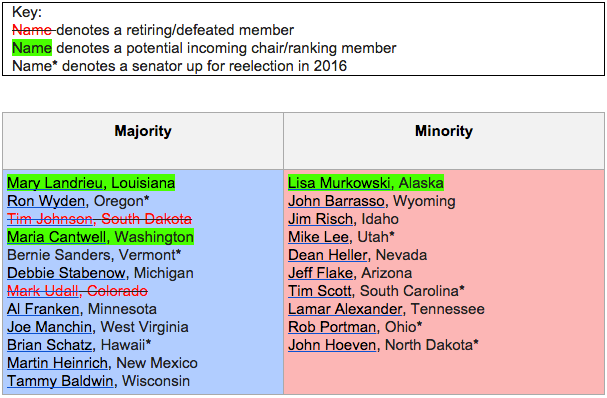
Expect little reshuffling, save for the upcoming ranking member, which depends on the outcome of Senator Landrieu’s December 6 runoff election. Senator Mark Udall’s loss is a blow to the clean energy movement, of which the Colorado Democrat was a strong ally. Senator Mary Landrieu’s anticipated loss will be difficult for the oil and gas industry, especially on the Democratic side of the aisle. Depending on the final ratio of Republicans to Democrats in the 114th Congress, we expect several new Republicans and perhaps one new Democrat to be added to the committee.
Senate Environment and Public Works Committee
Senator Jim Inhofe (R-OK) will chair the committee. Senator Inhofe is a climate change skeptic who wants to curb the EPA’s regulatory authority. He will try to scale back the EPA’s regulation of hydraulic fracking, its proposed coal ash rule, its ozone air quality standards, its CO2 standards for new, modified, and existing power plants, and its expanded jurisdiction per the Clean Water Act over U.S. waterways. Using the committee for oversight purposes, he will hold hearings to probe the impact and science of the EPA’s regulations. On a few other issues, however, Senator Inhofe works well with his Democratic colleagues with whom he could potentially pass a long-term highway bill, with support from the committee’s ranking member, Senator Barbara Boxer (D-CA), and a version of the Toxic Substances Control Reform Act, with support from Senators Tom Udall (D-NM) and Tom Carper (D-DE). But he will likely find little support from them as he seeks to overhaul the Obama Administration’s response to climate change. Senator Boxer, who will move to the ranking member slot, is an ally of environmentalists, and she will attempt to keep Democrats in line. Despite her close working relationship with Senator Inhofe, Senator Boxer will probably criticize his every move on energy and environmental policy.
Current committee make-up:
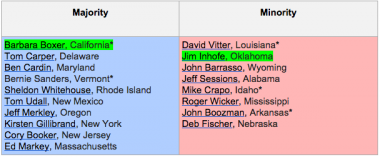
The committee’s make-up will barely change, other than a little reshuffling to ensure its composition matches the Senate’s. This likely means the addition of two Republicans on the committee and the loss of two Democrats. Senator Inhofe will assume the chairmanship over Senator David Vitter (R-LA), who held the ranking member slot last Congress because Senator Inhofe was term limited.
Senate Finance
Senator Orrin Hatch (R-UT) will chair this committee. He has expressed interest in tax reform. However, beyond repealing the Medical Device Tax and extending the Internet Tax Freedom Act, his other priorities might be in the area of tax policy. As they exhibited in their previous roles, Senator Hatch will have a strong partner in Senator Ron Wyden (D-OR) who will be the committee’s ranking member. Senator Wyden is a pragmatic and bipartisan dealmaker who has a good working relationship with Senator Hatch and Representative Paul Ryan (R-WI), who will likely chair the House Ways and Means Committee. The outcome of lame duck negotiations this month will determine the fate of expiring tax provisions, generally referred to as “extenders,” as Senator Wyden has spent much of his chairmanship focused on securing passage of an extenders package reported out of the committee this summer, S. 2260, The EXPIRE Act of 2014.
Current committee make-up:
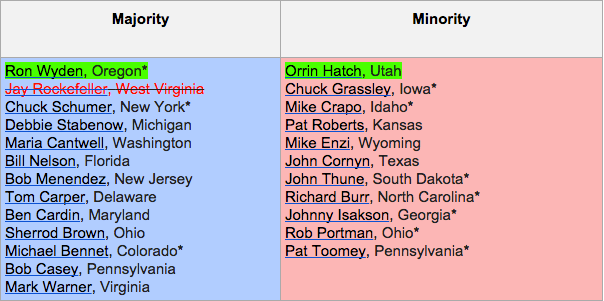
Again, expect little change, other than a little reshuffling to ensure the committee’s ratio matches the Senate’s. If the committee ratio is merely flipped, Senator Warner’s slot may be in jeopardy. On the Republican side, Senators Dean Heller (D-NV) and Dan Coats (R-IN) are rumored to be leading consideration to serve on the committee.
House Energy and Commerce Committee
Representative Fred Upton (R-MI) will continue to chair the committee. Energy legislation is atop the committee’s docket. Representative Upton wants to overhaul the 1976 Toxic Substances Control Act and promote electric reliability and affordability. Like Senator Inhofe, Representative Upton wants to neuter the EPA’s authority by giving to the states its power to regulate coal ash.
Representative Frank Pallone (D-NJ) narrowly defeated, 100-90, Representative Anna Eshoo (D-VA) in the House Democratic Caucus vote November 19 to become ranking member of the House Energy and Commerce Committee. Representative Pallone succeeds retiring Representative Henry Waxman (D-CA).
Current committee make-up:
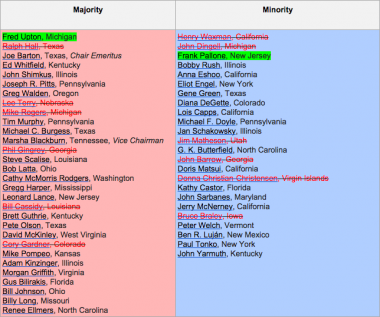
Expect a host of new members. With Representatives John Dingell (D-MI), John Barrow (D-GA), and Jim Matheson (D-UT) gone, the Democratic members, as a whole, are likely to be more liberal.
House Natural Resources Committee
Representative Bishop represents a rural district in northern Utah that has millions of acres of public land. He will seek to protect that land, and he may join with other Utah politicians in urging the government to cede that land back to the state. Other than on parochial issues, Representative Bishop will likely continue leading the committee as Chairman Doc Hastings (R-WA) did. Focusing on the Department of Interior, he will likely demand more transparency and budget cuts, along with protection of the fishing and traditional energy industries.
With Representative Raúl Grijalva (D-AZ), the chair of the Progressive Caucus, will shift the Democratic party’s center of gravity on issues related to energy development, climate change, and environmental protection in his new role as committee ranking member.
Current committee make-up:
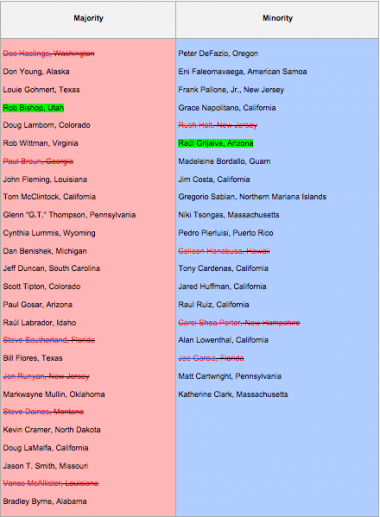
House Science Committee
Representative Lamar Smith (R-TX) will continue to chair the committee. His focus will be on energy and oversight. He will promote research into domestic energy production and nuclear energy technologies. He will also join other Republican chairs in scrutinizing the EPA’s regulations. Expect him to dig into all aspects of the regulations -- from the legal to the technical to the scientific. His fellow Texan, Representative Eddie Bernice Johnson (D-TX), will stay on as Ranking Member. She plans to defend the EPA and underscore the threat of climate change. She also intends to introduce a bill on synthetic biology this Congress, though she’s been mum about its details.
Current committee make-up:
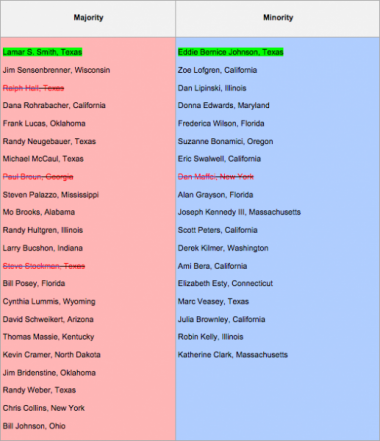
The committee is losing Representative Ralph Hall (R-TX), who chaired the committee from 2011 to 2013.
House Ways and Means Committee
With Chairman David Camp’s (R-MI) retirement, he passed his gavel onto Representative Paul Ryan (R-WI). Representative Ryan is a budget expert who chaired the Budget Committee for four years. He has expressed interest in tax reform, and is likely to base his plan on the former chairman’s. If Representative Ryan goes bold, his proposal will not attract Democratic support. However, if he collaborates with Democrats, he may be able to pass a scaled-down version of Representative Camp’s bill that only targets business taxes. Representative Sander Levin (D-MI) currently will retain his position as ranking member of the committee.
Current committee make-up:
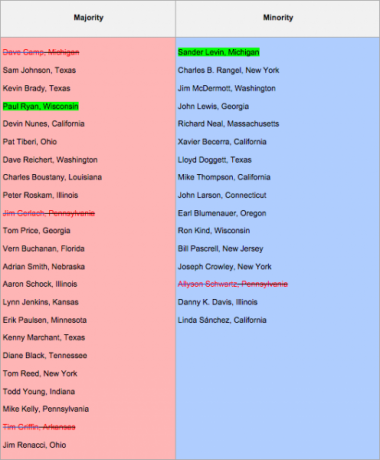
Changes will likely only come on the Republican side. Who the new members will be is an open question.



 />i
/>i

